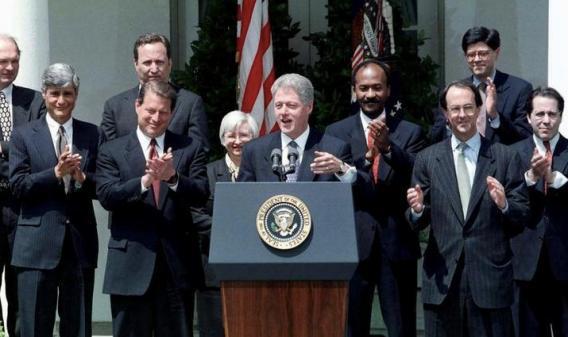Ezra Klein said today that the “subtext to these WH concerns with Yellen is that they didn’t see her as key part of their crisis team in 09” while “Summers was part of the team. And so there’s a lot of loyalty and trust towards Summers. Hard for Yellen to overcome those bonds.”
That’s true, but there’s an important subtext to the subtext. After all, everyone agrees that Summers was a core member of the 2009 team in a way that Yellen wasn’t. The reason that the Summers/Yellen choice is viewed so differently by the White House economic team (where support for Summers is overwhelming) than by the larger world of economic policy observers (where Yellen has much more support) is that the White House economic team has a very lofty view of the White House economic team’s performance in 2009.
I, personally, am not particularly criticial of the White House economic team’s performance in 2009. I don’t accept the right-wing conventional wisdom that Team Obama destroyed the economy with sharia socialism. And I don’t accept the left-wing conventional wisdom that Team Obama sacrificed the economy to appease the banksters. In the vast majority of contexts, I find myslef playing the role of Obama-defender and Geithner-apologist. But even so it seems to me that they made some crucial economic policy errors. Not a lot of errors. Faced with the need to make dozens of rapid-fire decisions they made the right call the vast majority of the time. They did some stuff (like the GM bailout) that I thought at the time would prove disastrous but which actually worked out fine.
But. It’s just really hard for me—and really hard for anyone who wasn’t actually on Team Obama at the time—to take quite as rosy a view of Team Obama’s handling of the situation as members of Team Obama do. Even the most sympathetic observers think some mistakes were made. Even people who are administration officials now but who weren’t on the team back in 2009 think some mistakes were made. But to a remarkable extent the key decision-makers on the economic policy team in 2013 are people who were on the team back in 2009. And there’s a real gap in perceptions even among people with similar overall ideologies and economic policy views as to whether “was a key economic policy decision-maker in 2009” is obviously a way of praising somebody.
